- Home
- Fergus Hume
The Mystery Queen Page 3
The Mystery Queen Read online
Page 3
“Had you ever seen Mrs. Brown before?” asked Durwin in his imperious voice, although he lowered it in deference to her grief.
Lillian winced at the harsh sound. “No, no! I never saw her before. How could I have seen her before? She said that her son had been drowned, and that she was poor. I asked Father to help her, and he told me he would. It’s my fault that she saw my father and now”—her voice leaped an octave—“he’s dead. Oh—oh! my father—my father!” and she tried to break from Mrs. Bolstreath’s arms to fling herself on the dead once more.
“Lillian darling, don’t cry,” said Dan, placing his hand on her shoulder.
“You have not lost the dearest and best of fathers!” she sobbed violently.
“Your loss is my loss,” said Halliday in a voice of pain, “but we must be brave, both you and I.” He associated himself with her so as to calm her grief. “It’s not your fault that your dear father is dead.”
“I persuaded him to see Mrs. Brown. And she—she—she—”
“We can’t say if this woman is guilty, as yet,” said Durwin hastily, “so do not blame yourself, Miss Moon. But did you smell any scent on this Mrs. Brown?”
Lillian looked at him vacantly and shook her head. Then she burst once more into hard and painful sobbing, trying again to embrace the dead man.
“Don’t ask her any questions, Sir,” said Halliday, in a low voice to Mr. Durwin, “you see she is not in a fit state to reply. Lillian,” he raised her up from her knees and gently but firmly detached her arms from the dead. “My darling, your father is past all earthly aid. We can do nothing but avenge him. Go with Mrs. Bolstreath and lie down. We must be firm.”
“Firm! Firm—and Father dead!” wailed Lillian. “Oh, what a wretch that Mrs. Brown must be to kill him! Kill her, Dan—oh, make her suffer! My good, kind father, who—who—oh”—she flung herself on Dan’s neck—“take me away! take me away!” and her lover promptly carried her to the door.
Mrs. Bolstreath, who had been talking hurriedly to Inspector Tenson, came after the pair and took the girl from Dan. “She must lie down and have a sleeping-draught,” she said softly. “If the doctor will come—”
The doctor was only too glad to come. He was a young man beginning to practise medicine in the neighbourhood, and had been hurriedly summoned in default of an older physician. The chance of gaining a new and wealthy patient was too good to lose, so he quickly followed Mrs. Bolstreath as she led the half-unconscious girl up the stairs. Dan closed the door and returned to the Inspector and the official from Scotland Yard. The former was speaking.
“Mrs. Bolstreath did not smell any perfume on Mrs. Brown,” he was saying, “and ladies are very quick to notice such things. Miss Moon also shook her head.”
“I don’t think Miss Moon was in a state of mind to understand what you were saying, Mr. Inspector,” said Halliday, drily. “However, I am quite sure from my own observation that Mrs. Brown did not use the perfume. I would have noticed it at once, for I spotted it the moment I examined the body.”
“So did I,” said Durwin once more; “but I thought Sir Charles might have used it. You say he did not, therefore the scent is a clue.”
“It does not lead to the indictment of Mrs. Brown, however, Sir,” said Tenson thoughtfully, “since she had no perfume of that sort about her. But she must have killed Sir Charles, for she was the last person who saw him alive.”
“She may come forward and exonerate herself,” suggested Dan after a pause, “or she may have left her address with Sir Charles.”
“I have glanced through the papers on the desk and can find no address,” was the Inspector’s reply; “yet, if she gave it to him, it would be there.”
Durwin meditated, then looked up. “As she was the mother of the man in Sir Charles’s employment who was drowned,” he said in his harsh voice, and now very official in his manner, “in the offices of the company who own the steamers—Sir Charles was a director and chief shareholder, I understand from his secretary Mr. Penn—will be found the drowned man’s address, which will be that of his mother.”
“But I can’t see what motive Mrs. Brown had to murder Sir Charles,” remarked Dan in a puzzled tone.
“We’ll learn the motive when we find Mrs. Brown,” said Tenson, who had made a note of Durwin’s suggestion. “Many people think they have grievances against the rich, and we know that the late Sir Charles was a millionaire. He doubtless had enemies—dangerous enemies.”
“Dangerous!” The word recalled to Dan what Moon had said at the dinner-table when Lillian had playfully offered him a penny for his thoughts. “Sir Charles at dinner said something about dangerous people.”
“What did he say?” asked the Inspector and again opened his note-book.
Dan reported the conversation, which was not very satisfactory, as Moon had only spoken generally. Tenson noted down the few remarks, but did not appear to think them important. Durwin, however, was struck by what had been said.
“Sir Charles asked me here to explain about a certain gang he believed was in existence,” he remarked.
“What’s that, Sir?” asked the Inspector alertly. “Did he tell you anything?”
“Of course he didn’t. How could he when he was dead when I arrived?” retorted Durwin with a frown. “He simply said that he wished to see me in my official capacity about some gang, but gave me no details. Those were to be left until I called here. He preferred to see me here instead of at my office for reasons which he declared he would state when we met in this room.”
“Then you think that a gang—”
“Mr. Inspector,” interrupted Durwin, stiffly, “I have told you all that was said by the deceased. Whether the gang is dangerous, or what the members do, or where they are, I cannot say. Have you examined these windows?” he asked suddenly, pointing to three French-windows at the side of the room.
“Yes,” said Tenson promptly, “as soon as I entered the apartment I did so. They are all locked.”
“And if they were not, no one could enter there,” put in Dan quickly. “Outside is a walled garden and the wall is very high with broken bottles on top. I suppose, Mr. Durwin, you are thinking that someone may have come in to kill Sir Charles between the time of Mrs. Brown’s departure and your coming?”
“Yes,” assented the other sharply, “if the perfume is a clue, Mrs. Brown must be innocent. Penn, as we know from the statement of the typewriter girl, was in his room all the time, and the servants have fully accounted for themselves. We examined them all—the Inspector and I did, that is—when you were at the theatre,” he waved his hand with a shrug. “Who can say who is guilty?”
“Well,” said Tenson, snapping the elastic-band round his note-book and putting it into his pocket, “we have the evidence of the fly and the perfume.”
“What do you think about the fly?” asked Dan, staring.
“I don’t know what to think. It is an artificial fly, exquisitely made and has been gummed on the dead man’s neck behind the left ear. The assassin must have placed it there, since a man would scarcely do such a silly thing himself. Why it was placed there I can’t say, any more than I can guess why Sir Charles was murdered, or who murdered him. The affair is a complete mystery, as you must admit.”
Before the inquest and after the inquest, more people than the three men who had held the discussion in the presence of the dead, admitted that the affair was a mystery. In fact the evidence at the inquest only plunged the matter into deeper gloom. Tenson, acting on Darwin’s advice, sought the office of the tramp-steamer company—the Universal Carrier Line—in which the late Sir Charles was chief shareholder and director, to learn without any difficulty the whereabouts of Mrs. Brown, the mother of the drowned man. She proved to be an entirely different person to the woman who had given the name on the fatal night, being lean instead of stout, comparatively young instead of old, and rather handsome in an elderly way in place of being wrinkled and worn with grief. She declared that she had never be
en near Moon’s house on the night of the murder or on any other night. Mrs. Bolstreath, Lillian, the footman, and Dan all swore that she was not the Mrs. Brown who had sought the interview with Sir Charles. Therefore it was argued by everyone that Mrs. Brown, taking a false name and telling a false story, must have come to see Moon with the deliberate intention of murdering him. Search was made for her, but she could not be found. From the moment she passed out of the front door she had vanished, and although a description was published of her appearance, and a reward was offered for her apprehension, no one came forward to claim it. Guilty or innocent, she was invisible.
Inspector Tenson did not speak at the inquest of the gang about which Sir Charles had intended to converse with Mr. Durwin, as it did not seem to have any bearing on the case. Also, as Durwin suggested, if it had any bearing it was best to keep the matter quiet until more evidence was forthcoming to show that such a gang—whatever its business was—existed. Then the strange episode of the fly was suppressed for the same reason. Privately, Tenson informed Dan that he would not be surprised to learn that there was a gang of murderers in existence whose sign-manual was a fly, real or artificial, and instanced another gang, which had been broken up some years previously, who always impressed the figure of a purple fern on their victims. But the whole idea, said Tenson, was so vague that he thought it best to suppress the fact of the artificial fly on the dead man’s neck. “If there’s anything in it,” finished the Inspector, “there’s sure to be other murders committed, and the fly placed on the victim. We’ll wait and see, and if a second case occurs, we’ll be sure that such a gang exists and will collar the beasts. Best to say nothing, Mr. Halliday.”
So he said nothing, and Dan said nothing, and Durwin, who approved of the necessary secrecy, held his tongue. Of course there was a lot of talk and many theories as to who had murdered the millionaire, and why he had been murdered in so ingenious a manner. The post-mortem examination proved that Moon had died of snake-poison administered through the scratch on the neck, and the circumstantial evidence at the inquest went to show that he must have been taken unawares, while bending over his desk. Some people thought that Mrs. Brown was innocent because of the absence of the perfume; others declared she must be guilty on account of her false name and false story, and the fact that Moon was found dead a quarter of an hour after she left the house. No doubt, the circumstantial evidence was very strong, but it could not be said positively that the woman was guilty, even though she did not appear to defend her character.
So the jury thought, for they brought in the only possible verdict twelve good and lawful men could bring in: “Wilful murder against some person or persons unknown,” and there the matter ended for sheer want of further evidence. The affair was a mystery and a mystery it remained.
“And will until the Day of Judgment!” said Tenson, finally.
Chapter III. DUTY BEFORE PLEASURE
The year ended sadly for Lillian, since she had lost her father, her lover, and her home, gaining instead the doubtful companionship of a paternal uncle, who stepped into the position of guardian. The girl, although she did not know it at the time, was leaving a pleasant flowery lane to turn into a flinty high road, arched by a dismal sky. It is true that she still possessed Mrs. Bolstreath to comfort her, but the loss of Dan could scarcely be compensated by the attentions of the chaperon. Not that Halliday was altogether lost; but he had been pushed out of her life by Sir John Moon, who approved as little of this suitor as the late baronet had done.
“You see, my dear child,” he explained to Lillian, immediately after the new year and when things were more restful, “as your guardian and uncle, I have to see that you make a good match.”
“What is marriage without love?” queried Miss Moon scornfully.
“Love!” Sir John shrugged his elegant shoulders and sneered. “Love is all very well, but a title is better. I say nothing about money, as you have any amount of that useful article. Now, Lord Curberry—”
“I detest Lord Curberry, and I shan’t marry Lord Curberry,” interrupted Lillian, frowning, and her mind held a picture of the lean, ascetic peer with the cruel, grey eyes. As a barrister, Curberry was no doubt admirable; as a nobleman, he filled his new position very well; but she could not see him as a lover, try as she might. Not that she did try, for under no conditions and under no pressure did she intend to become his wife.”
“Your father wished you to marry Lord Curberry,” hinted Uncle John softly.
“My father wished me to be happy,” cried Lillian hotly, “and I can’t be happy unless I marry Dan.”
“That aviator man! Pooh! He has nothing to give you.”
“He gives himself, and that is all I want.”
“I see. Love in a cottage and—”
Lillian interrupted again. “There’s no need for love in a cottage. I have plenty of money; you said as much yourself, Uncle John.”
“My dear,” said the new baronet gravely, “from what I saw of young Halliday he is too proud a man to live on his wife. And you would not respect him if he did. I think better of you than that, my child.”
“Dan has his profession.”
“H’m! And a dangerous one at that. Besides, he doesn’t make much money.”
“He will though. Dan is a genius; he has all kinds of ideas about flying machines, and some day he will conquer the air.”
“Meantime, you will be growing old waiting for him.”
“Not at all,” Lillian assured him. “I shall be with him, helping all I can.”
“You won’t with my consent,” cried her uncle, heatedly.
“Then I shall do without your consent. I shan’t give up Dan.”
“In that case,” sighed Sir John, rising to show that the interview was ended—and certainly it had ended in a clash of wills—“there is nothing for me to do but to make young Halliday give you up.”
“He’ll never do that,” said Miss Moon, pausing at the door with a fluttering heart, for her uncle spoke very decidedly.
“Oh, I think so,” replied Moon, with the air of a man sure of his ground. “He has, I am sure, some notion of honour.”
“It isn’t honourable to give up a woman.”
“It isn’t honourable to live on a woman.”
The two antagonists glared at one another, and a silence ensued. Neither would give way, and neither would compromise in any way. Lillian wanted Dan as her husband, a post Sir John did not intend the young man to fill. But he saw plainly enough that harsh measures would drive Lillian to desperation, and he did not yet know sufficient of Halliday to be sure that he would not grasp at a rich wife. Sir John believed that men were like himself, and would do anything—honourable, or, at a pinch, dishonourable—to secure a life of ease and comfort. However, as he swiftly reflected, Halliday was young, and probably would be wax in the hands of a clever man, such as Moon considered himself to be. It would be best to see him and control the boy’s mind by appealing to his decency—so Sir John put it.
“Very good, my dear,” he said, when he reached this point, “matters are at a dead-lock between us. I suggest that you let me interview Halliday.”
“I don’t mind, so long as I see him first,” pouted the girl, mutinously.
Sir John smiled drily. “So as to arm him for the fray. Very well. I consent, my dear. You can arrange your campaign, and then I can discuss the matter with this very undesirable suitor. But you must give me your promise that you will not run away with him meanwhile.”
Lillian held herself very erect and replied stiffly. “Of course I promise, Uncle John. I am not ashamed of loving Dan, and I shall marry him in a proper manner. But I shan’t marry Lord Curberry,” she ended, and fairly ran away, so as to prevent further objections.
“Oh, my dear, I think you will,” grinned Sir John at the closed door, and he sat down to pen a diplomatic letter to Mr. Halliday, earnestly wishing to have the matter settled and done with. “These romantic young nuisances,” said the schemer c
rossly.
The new baronet was a slim, well-preserved dandy of sixty, who looked no older than forty-five, owing to the means he took to keep himself fit. He was the younger and only brother of Moon, and inherited the title since there was no nephew to take it. He also inherited ten thousand a year on condition that he acted as Lillian’s guardian. It was no mean task, for the girl had an income of £50,000 coming in every twelve months. There would be plenty of hard-up flies gathering round this honey-pot, and Sir John foresaw that it would not be an easy business to settle the young lady’s matrimonial future, especially as the said young lady was obstinate beyond belief. Sir John, being a loafer by nature, had never possessed sufficient money to indulge to the full in his luxurious tastes, since his brother had not financed him as largely as he could have wished. But now that he was safe for the rest of his life on an income which would enable him to enjoy the world’s good, Sir John did not wish to be bothered. It was his aim to get his niece married and settled as soon as possible, so that she could be looked after by a husband.
Under these circumstances, and since Lillian was anxious to marry Dan, it was strange that the baronet should not allow her to indulge her fancy. He objected for two reasons: one was that he really did not think Halliday a good match; and, moreover, he knew of his late brother’s opinion concerning the matter of the wooing. The second reason had to do with the fact that he had borrowed a large sum of money from Lord Curberry, and did not wish to pay it back again, even though he could do so easily enough in his present flourishing circumstances. Curberry offered to forego the payment if Sir John could persuade Lillian to marry him. And as Moon wanted to be able to talk about the girl as a peeress, and did not want to reduce his new income by frittering it away in paying back debts, he was determined to bring about the very desirable marriage, as he truly considered it to be.

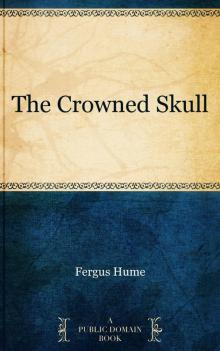 The Crowned Skull
The Crowned Skull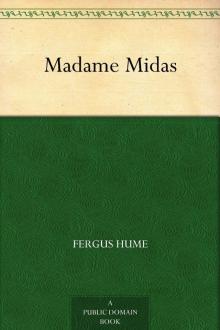 Madame Midas
Madame Midas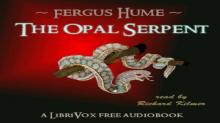 The Opal Serpent
The Opal Serpent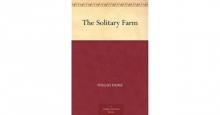 The Solitary Farm
The Solitary Farm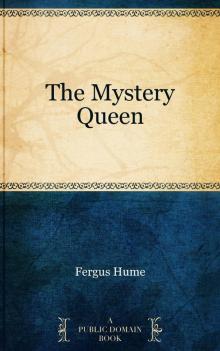 The Mystery Queen
The Mystery Queen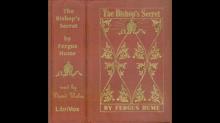 The Bishop's Secret
The Bishop's Secret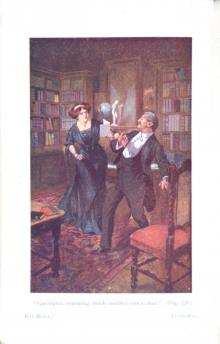 Red Money
Red Money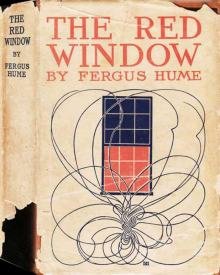 The Red Window
The Red Window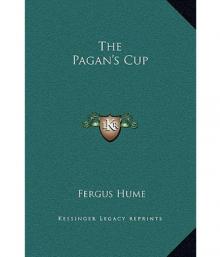 The Pagan's Cup
The Pagan's Cup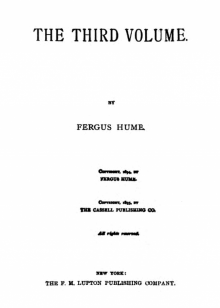 The Third Volume
The Third Volume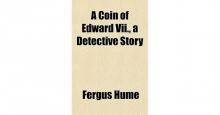 A Coin of Edward VII: A Detective Story
A Coin of Edward VII: A Detective Story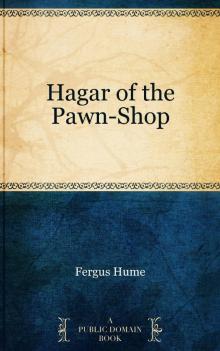 Hagar of the Pawn-Shop
Hagar of the Pawn-Shop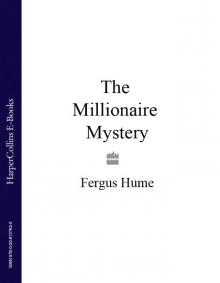 The Millionaire Mystery
The Millionaire Mystery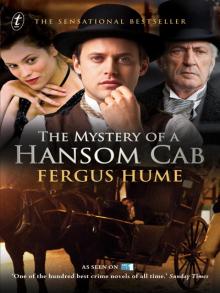 The Mystery of a Hansom Cab
The Mystery of a Hansom Cab